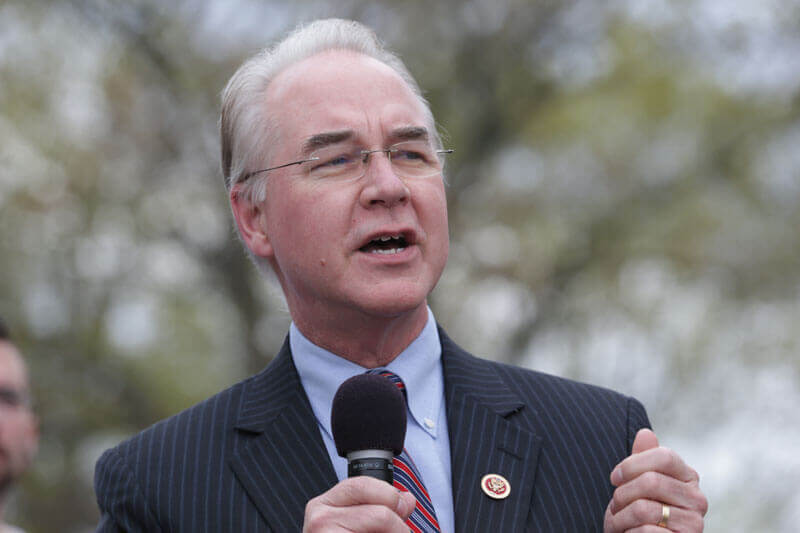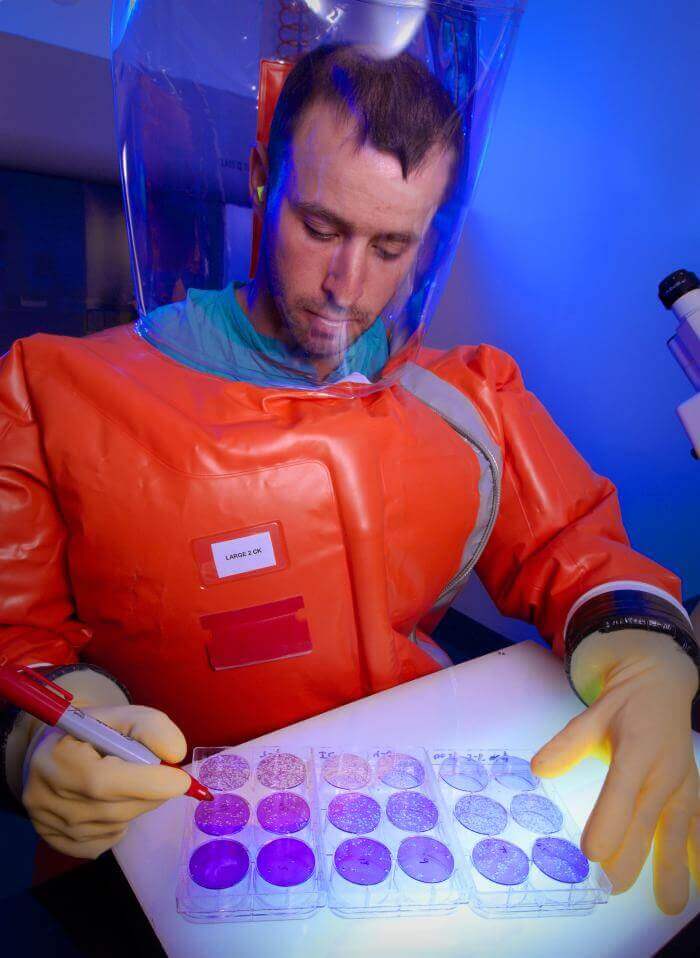Courtney CarsonGHTC
Courtney Carson is a policy and advocacy officer at GHTC, who leads GHTC's US advocacy portfolio.
 Representative Tom Price. Photo: Flickr/Mark TaylorThe Senate continues to consider the nomination of Representative Tom Price (R-GA) to serve as Secretary of Health and Human Services (HHS), following
his nomination hearings before the Senate Health, Education, Labor and Pensions Committee and the Senate Finance Committee, which concluded yesterday.
If confirmed, Price will assume leadership of a department that plays a critical role in advancing the development of new global health innovations
through its sub-agencies including the National Institutes of Health (NIH), Centers for Disease Control and Prevention (CDC), and Food and Drug Administration.
As head, Representative Price will play an influential role in strategy and decision-making at these agencies.
Representative Tom Price. Photo: Flickr/Mark TaylorThe Senate continues to consider the nomination of Representative Tom Price (R-GA) to serve as Secretary of Health and Human Services (HHS), following
his nomination hearings before the Senate Health, Education, Labor and Pensions Committee and the Senate Finance Committee, which concluded yesterday.
If confirmed, Price will assume leadership of a department that plays a critical role in advancing the development of new global health innovations
through its sub-agencies including the National Institutes of Health (NIH), Centers for Disease Control and Prevention (CDC), and Food and Drug Administration.
As head, Representative Price will play an influential role in strategy and decision-making at these agencies.
Price did not directly discuss HHS’s engagement in global health research at either hearing, but he did address global health and infectious diseases; innovation for rare diseases; support for health innovation, NIH, and priority setting for NIH-funded research.
Here’s what he said:
Senator Ben Cardin (D-MD) questioned Representative Price on how the reinstatement and expansion of the Global Gag Rule under the Trump administration will affect HHS operations and active participation in international global health bodies. This rule restricts all US global health funding from being used to support international organizations that provide abortion services, counseling, or referrals; or advocate for the liberalization of abortion laws, even if they do so without US funds. Senator Cardin asked Representative Price how he will ensure the United States can “fully participate” in global health efforts to address “maternal health, to help stopping the spread and ending HIV and AIDS […] to make sure that the next Zika virus, that we [are] able to contain it so it doesn't cause the catastrophic effects if the Global Gag Rule is enforced in a way that prevents us from participating in international health organizations?
While Representative Price didn’t address the impact of the Global Gag Rule on HHS’s international engagement in response, he did stress the importance of active engagement in the global response to infectious diseases, calling the question “really important,” and noting that his goal if confirmed is to “gather the best minds and the best talent that we have within the department and without and determine what is wisest policy for this nation to have [as] it relates to […] infectious disease.” He further elaborated on his support for ongoing infectious disease work saying, “germs know no geographic boundaries. And we do incredible work, the work that the CDC does and the work that's done by others in our nation that try to prevent infectious disease, work to detect the spread of infectious disease and then provide a logical and methodical and aggressive response to the outbreak of any infectious disease is absolutely vital to protect the American people, and we're committed to doing so.” S
Senator Cardin expressed his agreement and hope that Representative Price “will look at perhaps unintended consequences from […] executive orders that could compromise our ability to be as effective as we need to, using all tools at our disposal.”
While under previous administrations, the Global Gag Rule only applied to organizations receiving family planning–specific funds—which account for about US$600 million in federal funding—the expanded version of the rule applies to organizations that receive any global health money. This means that approximately $9.5 billion in US funding for global health programs administered by the US Agency for International Development, the State Department, and HHS—which address a range of issues including maternal and child health, nutrition, HIV and AIDS (including the President’s Emergency Plan for AIDS Relief), malaria, tuberculosis (TB), and other infectious diseases—is subject to the rule. This could have a dramatic impact on the ability of organizations funded by US global health accounts to team with international partners to develop, test, roll out, and monitor new global health technologies around the world.
 CDC research. Photo: CDC/Dr. Scott SmithSenator Orrin Hatch (R-UT) discussed rare diseases, attesting that the Affordable Care Act prevents “investments and innovative therapies that can cure
and save lives.” He asked Representative Price what steps he believes “will improve the pipeline for rare disease therapies to bring treatments and
cures to patients in desperate need of hope.”
CDC research. Photo: CDC/Dr. Scott SmithSenator Orrin Hatch (R-UT) discussed rare diseases, attesting that the Affordable Care Act prevents “investments and innovative therapies that can cure
and save lives.” He asked Representative Price what steps he believes “will improve the pipeline for rare disease therapies to bring treatments and
cures to patients in desperate need of hope.”
Price replied that the Orphan Drug Act has “revolutionized the ability to treat rare diseases” and that it made “the United States the leader in coming forward with treatments for rare diseases.” He highlighted that there are actions the government can take “in terms of patent protection, in terms of liability, in terms of incentivization [of] resources to be able to encourage the discovery of cures for rare diseases” but stopped short of providing details about specific reforms or new policies he proposes. Price also said that the Orphan Drug Act, which Senator Hatch cited as creating “an explosion” of drugs for rare diseases is “one of the success stories truly for public policy in the country.”
Rare diseases are defined as diseases that affect less than 200,000 people in the United States, or those for which investment in a new product is not expected to yield financial return. The Orphan Drug Act, and other provisions to incentivize the development of tools for rare diseases, can also be used to support the development of new technologies for neglected diseases, which affect millions of people around the world, yet few in the United States. Continued support for vehicles that advance the development of tools for orphan and rare diseases—in addition to new steps to ensure that these programs work to support neglected disease research and development (R&D)—is critical to advancing US support for global health R&D.
Discussing Representative Price’s commitment to public service, Senator Rand Paul (R-KY) asked, “What are your motives? [...] What are your goals? [...] Do you want more people to have health care? Or do you think we disagree on just how we do it and not necessarily on the motives?” In listing principles that he believes are “absolutely imperative for a health care system,” Representative Price said that the system must incentivize innovation “because it is innovation that drives high-quality health care.”
Senator Susan Collins (R-ME) cited biomedical research as a “passion,” noting that “if we invest in biomedical research, we have the possibility of not only improving lives for Americans and curing or coming up with effective treatments for devastating diseases, but also lowering health care costs.”
When asked by Senator Collins if he supports “increases for the NIH” passed last year and under consideration this year, Price replied, “NIH is a treasure for our country, and the kind of thing we should be doing to find cures for those diseases. One of the core avenues to be able to make that happen is through NIH, and I supported the increase [as a member of Congress].”
Senator Patrick Toomey (R-PA) also questioned Representative Price on his views on NIH research and allocation of resources. Citing 5.2 million Americans with Alzheimer’s—a disease for which there is no cure or treatment—Senator Toomey noted that NIH spending on the disease is $168 per diagnosed patient and asked if Representative Price would commit to “ensure that we have a better proportionality in terms of the allocation of resources and the breadth and severity of illnesses.” Representative Price responded, “I think it's absolutely imperative, Senator, and I look forward to working with you.”
NIH is the largest financial supporter of global health R&D in the world. Its work to advance basic research on infectious diseases like HIV and AIDS, TB, malaria, neglected tropical diseases, and emerging diseases like Ebola and Zika—as well as research in maternal and child health—has led to important scientific breakthroughs that have transformed treatment in the United States and around the world. Continued and robust support for these research areas is critical to ongoing progress in global health.
At GHTC, we will continue to monitor Price’s views on US support for global health and medical innovation and urge strong support for programs that further the development and rollout of urgently needed global health technologies.